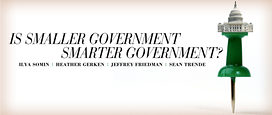Lead Essay
Ilya Somin argues that political ignorance is pervasive and extends to an alarming number of elementary topics. Voters simply don’t have the information that they need to make informed decisions. Increasing education seemingly hasn’t alleviated the problem, and voters tend to choose based not on facts or values, but on the basis of team-like partisan allegiances. This behavior is to some extent rational, because the payoffs are essentially zero for any one voter becoming more informed. It may thus be unreasonable to expect voters to become highly educated on matters of public policy. What we need, he argues, is instead a structural change: Make government a smaller and less consequential part of our everyday lives.
Response Essays
The Fox and the Hedgehog: How Do We Achieve Political Accountability Given What Voters (Don’t) Know?
Heather Gerken finds much of interest in Ilya Somin’s work on political ignorance, a topic that has only gradually come into its own among law professors despite considerable social scientific research demonstrating political ignorance among real-world voters. She characterizes Somin’s view of political ignorance as “fox-like,” in the sense used by Isaiah Berlin: A fox knows a little about a lot of different things. Like Berlin’s fox, Somin’s voters will be apt to move from one environment to another. But she wonders whether this is a proper description of American voters. She contrasts Somin’s thesis with the work of David Schleicher, who suggests that most voters rely on party affiliation as an information shortcut. Gerken argues that the debate between Somin and Schleicher raises fundamental questions about the future of our democracy.
Sean Trende argues that while political elites may find voters startlingly ignorant, the system doesn’t really seem to be broken. It has often functioned quite well despite voters’ ignorance. He suggests that this is so for two reasons: First, much of what passes for expert knowledge is really nothing of the kind, so adding it to voters’ heads does not therefore constitute an improvement. Second, public opinion on many normative matters is ultimately more or less decent, and from it, relatively good policies flow.
Jeffrey Friedman argues that rational ignorance theory is false. Voters vote because they mistakenly believe that their votes are likely to matter. They remain ignorant not because they think their votes are irrelevant, but because they mistakenly believe that the world is a very simple place. In such a world, it would take very little knowledge to make an informed decision about politics. Sadly, that’s not the world we live in; in reality, political decisions are complex and difficult. Friedman argues that both genuinely ignorant voters and blinkered ideologues fit this model, and that it conforms better to the available data on voter motivations than does the theory of rational ignorance.
The Conversation
Related at Cato
Cato @ Liberty: “Sequestration and Voter Ignorance,” by Ted DeHaven. March 2013.
Cato Unbound: “Majority Fools? Irrationality and the Limits of Democracy,” with Bryan Caplan, David Estlund, Loren Lomasky, and Jeffrey Friedman. November 2006.
Policy Analysis: “When Ignorance Isn’t Bliss: How Political Ignorance Threatens Democracy” by Ilya Somin. September 2004.

